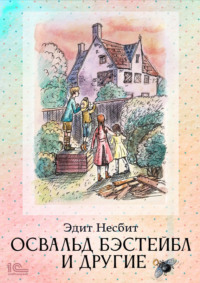 полная версия
полная версияMan and Maid
The silence had grown to the limit that spells discomfort; the ticking of the tall clock, the rustle of the plane tree’s leaves outside the window, the discords of Fleet Street harmonised by distance, all deepened the silence and italicised it. She spoke.
“Well?” she said.
The plane tree’s leaves murmured eloquently of the great oaks in the park. The old lady’s eyes looked at him appealingly through the pale-smoked glasses. How she would like that old place! And his debts – he could pay them all.
“I will,” he said suddenly; “if you will, I will; and I pray you may never regret it.”
“I don’t think you will regret it,” she said gently; “it is a truly kind act to me.”
Bank and solicitor, duly consulted, testified to Miss Thrale’s respectability and to her income – the requisite hundred a year in Consols. And on a certain day in June Michael Wood woke from a feverish dream, in which obstinacy and the longing for money had fought with many better things and worsted them, to find himself married to a white-haired woman of sixty.
The awakening took place in his rooms in the Temple. He had yielded to the little old lady’s entreaties, and consented, most willingly, to forego the “wedding journey,” in this case so sad a mockery.
The set was a large one – five rooms; it seemed that they might live here, and neither irk the other.
And she was in the room he had caused to be prepared for her – dainty and neat as herself – and he, left alone in the room where he had first seen her, crossed his arms on the table, and thought. His wedding-day! And it might have been Sylvia, the rustle of whose dress he could hear in the next room. He groaned. Then he laid his head on his arms and cried – like a child that has lost its favourite toy: for he saw, suddenly, that respect for his old wife must keep him from ever seeing Sylvia now; and life looked grey as the Thames in February twilight.
A timid hand on his shoulder startled him to the raising of his tear-stained face. The little old lady stood beside him.
“Ah, don’t!” she said softly – “don’t! Believe me, it will be all right. Your old wife won’t live more than a year – I know it. Take courage.”
“Don’t!” he said in his turn; “it’s a wicked thing I’ve done. Forgive me! If only we could have been friends. I can’t bear to think I shall make you unhappy.”
“My dear boy,” she said, “we are friends. I am your housekeeper. In a year at latest you will see the last of my white hairs. Be brave.”
He could not understand the pang her words gave him.
And now began, for these two, a strange life. In those Temple rooms – ideal nest for young lovers – Mrs Wood, the white-haired, kept house with firm and capable little hands. Comfort, which Michael’s lazy nature loved but could not achieve, reigned peacefully. The old lady kept much to her own rooms, but whenever he needed talk she was there. And she could talk. She had read much, reflected much. In her mind his own ideas found mating germs, and bore fruit of beautiful dreams, great thoughts. His verses – neglected this long time, since Sylvia did not care for poetry – flourished once more.
And music – Sylvia’s taste in music had been Sullivan; the old wife touched the piano with magic fingers, and Bach, Beethoven, Wagner came to transfigure the Temple rooms. Michael had never been so contented – never so wretched; for, as the quiet weeks went by, the leaves fell from the plane tree, and the time drew near when he must show his wife to the tenants – his white-haired wife. In these months a very real friendship had grown up between them. Michael had never met a woman, old or young, whose tastes chimed so tunefully with his own. Ah! what a pity he had not met a young woman with these tastes – this soul. And now, liking, friendship, affection – all the finer, nobler side of love – he could indeed feel for his old wife; but love – lovers’ love, that would set the seal on all the rest – this he might never know, except for some other woman, who would succeed to his wife’s title.
Badly as Michael had behaved, I think it is permissible to be sorry for him. His wife, in fact, was very sorry.
One day he met Sylvia in the park, and all the other side of him thrilled with pleasure. He sat by her an hour, his eyes drinking in her fresh beauty, while his soul shrivelled more and more. Ah! why could she not talk, as his wife could, instead of merely chattering?
His wife looked sad that evening. He asked the reason.
“I saw you in the park to-day,” she said. “Are you going to see her? Don’t compromise her: it’s not worth while.”
He kissed her hand in its black mitten, and in a flash of pain saw the black funeral, when she should be carried from his house, and he be left free to marry Sylvia.
And now the days had dropped past; so even was their flow that it seemed rapid, and in another week it would be Christmas.
“And I must show you to the tenants,” said he.
“My poor boy,” she said – it was just as she had risen to bid him good night – “be brave. Perhaps it won’t be so bad as you think. Good night.”
He sat still after she had left him, gazing into the fire, and thinking thoughts in which now the estate and the fortune played but little part. At last he shrugged his shoulders.
“Well,” he said, “I have no lover, no wife; but I have a companion, a friend – one in a million.” And again the black funeral trailed its slow length before his eyes, and he shuddered.
I have not sought to deceive the reader. He knows as well as I do that at this moment the door opened, and a young and beautiful woman stood on the threshold. Her eyes were shining; round her neck were gleaming pearls. She was playing for a high stake, and being a true woman she had disdained no honest artifice that might help her. She wore shining white silk, severely plain, and her brown hair was dressed high on her head. A woman one shade less intuitive would have let the dusky masses fall over a lace-covered tea-gown.
“Michael,” she said, “I am your wife. Are you going to forgive me?”
He raised himself slowly from his chair, and his eyes dwelt on detail after detail of the beauty before him.
“My wife!” he said. “You are a stranger!”
“I did disguise myself well. My sister told me about your advertisement; she lives with Sylvia Maddox. We each have a hundred pounds a year. At first I did it for fun; but when I had seen how – how nice you were – my mother is very poor. There are no excuses. But are you going to forgive me?” Any other woman, to whom forgiveness meant all that it meant to her, might have kneeled at his feet. Frances stood erect by the door. “Anyway,” she said, biting her lip, “I have saved you from Sylvia. For the sake of that, forgive me.”
That stung him, as she had known it would.
“Forgive you?” he said. “Never. You’ve spoiled my life.” But he took a step towards her as he spoke.
She took an equal step back.
“Take courage,” she said. “Who knows but I may die before next June, after all. Good night.”
“I hate you,” he said, and took another step forward. But the door closed in his face.
Next morning the old lady, white haired and mittened, appeared behind the breakfast tea. Michael almost thought he had dreamed, till her eyes, now without their glasses, met his timidly.
“Let us end this play-acting, at least,” he said. Ten minutes of fuming ended in tepid tea poured by a beautiful brown-haired girl.
He watched her in silence.
“It’s horrible,” he broke out. “You’re a strange woman, and there you sit, pouring tea out as if – Who are you? I don’t know you.”
“Don’t you?” she said quietly. And then he remembered all the old talks with the old wife.
“I beg your pardon,” he said. “I don’t want to be a brute.”
“It’s no use my saying I’m sorry,” she said.
“Are you?” He leaned forward to put the question.
“We must make the best of it,” she said. “Perhaps – Look here, don’t let’s speak of it till after Christmas; let’s just go on as we did before.”
So the days wore on. But the situation when Michael lived in torment in the company of his old wife was simplicity itself compared to his new life with a wife – young, beautiful, and a stranger, yet in all essentials his dearest friend. This discomfort grew daily – hourly branching out into ever fresh embarrassments – new and harassing, vexatious, half understood, wholly resented.
The wife had her burden to bear also. The laundress had only known the old wife as “Mrs Wood.”
“She thought I was your mother,” the wife said when Michael propounded the difficulty. But the laundress’s attitude to the new Mrs Wood had a sting that was almost punishment enough to the wife, had Michael only known, for all that she had done amiss.
The hour of departure for the Christmas festivities at Wood Grange came as a relief from the persistent pinpricks of unexplained emotion which tormented him. His wife was young and beautiful, yet he was only conscious of repulsion. He hated her for her trickery. But most he hated her because she had cheated him of the old wife – the friend, the confidante, who had grown to be so much, and so much the best part, in his life. For now there was no confidence between the two – no talk, no reading, no music to brighten the Temple rooms. They lived in an almost complete silence.
Every window of the Grange shone out with yellow light across the snow. For once Christmas had been kind and seasonable – a white sheet covered the world. Holly gleamed against old oak. Priceless silver, saved from the smelting-pot in Cromwell’s hard days, shone above white napery on the long tables. The tenants’ dinner was over, and now was the moment when, according to the will, Michael Wood’s wife must be presented to the tenants then assembled.
The slender figure in white woollen cloth and white fur, with Christmas roses at its breast, stood on the daïs at the end of the great hall, and the tenants cheered themselves hoarse at the mere sight of her beautiful face, her kind eyes.
“It went off very well,” Michael said when, the last guest gone, the last shutter closed, the last servant departed, the two stood alone in the long drawing-room.
“Yes; think if you had had to present to them the old white-haired wife – ”
“I loved the old wife,” he said obstinately; but his voice was not quite steady.
“I wish,” she said, playing with the Christmas roses she wore, “I wish you would try to forgive me. It was horribly wrong; but I began it as a joke. You see, I had only just come over from the convent where I was brought up. I thought it would be such fun: I was always good at theatricals. I will never do anything silly again. And to-morrow I’ll go away, and you need never see me again. And you have got the money and the old place, haven’t you? And I got them for you – and – do forgive me. It began as a silly schoolgirl’s joke indeed.”
“But – a convent! You have read and thought – ”
“It was my father. He made me read and think; and when he died all the money went, and my mother is poor. Oh, Michael, don’t be so flinty! Say you forgive me before I go! It all began in a joke!”
“Began. Yes. But why did you go on?”
“Because I – I didn’t like Sylvia – and I liked you – rather – but I won’t be a nuisance. I’ll go back to mother. Say you forgive me. I’ll go by the first train in the morning.”
“The first train,” said Michael absently, “is the 9.17; but to-morrow is Christmas Day – I daresay they’ll run the same as on Sunday.”
She took her white cloak from the settle by the fire.
“Good night,” she said sadly; “you are very hard. Won’t you even shake hands?”
“We had no roses at our wedding,” he said, still absently; “but there are roses at Christmas.” He raised his hand to the white flowers she wore, and touched them softly. “White roses, too, for a wedding,” he said.
“Good night!” she said again.
“And you will go to your mother to-morrow by the 9.17 train, or the 10.5, if the trains run the same as on Sunday. And I am to forgive you, and shake hands before we part. Well, well!”
He took the hand she held out, caught the other, and stood holding them, his grey eyes seeking hers. Her head thrown back, her hands stretched out, she looked at him from arm’s length.
“Dear!” he said.
A mute glance questioned him. Then lashes longer than Sylvia’s veiled the dark eyes.
He spoke again. “Dear!”
“You know you hate me,” she said.
He raised her hands to his lips.
“Have you forgotten Sylvia?”
“Absolutely, thank God! And you – I – after all, we are married, though there were no roses at our June wedding.”
Again her eyes questioned mutely.
He leaned forward and touched the Christmas roses with his lips. Then he dropped her hands and caught her by the shoulders.
“Oh! foolish, foolish, foolish people!” he said. “We two are man and wife. My wife! my wife! my wife! We are, aren’t we?”
“I suppose we are,” she said, and her face leaned a little towards his.
“Well, then!” said he.
X
THE HOUSE OF SILENCE
The thief stood close under the high wall, and looked to right and left. To the right the road wound white and sinuous, lying like a twisted ribbon over the broad grey shoulder of the hill; to the left the road turned sharply down towards the river; beyond the ford the road went away slowly in a curve, prolonged for miles through the green marshes.
No least black fly of a figure stirred on it. There were no travellers at such an hour on such a road.
The thief looked across the valley, at the top of the mountain flushed with sunset, and at the grey-green of the olives about its base. The terraces of olives were already dusk with twilight, but his keen eyes could not have missed the smallest variance or shifting of their lights and shadows. Nothing stirred there. He was alone.
Then, turning, he looked again at the wall behind him. The face of it was grey and sombre, but all along the top of it, in the crannies of the coping stones, orange wallflowers and sulphur-coloured snapdragons shone among the haze of feathery-flowered grasses. He looked again at the place where some of the stones had fallen from the coping – had fallen within the wall, for none lay in the road without. The bough of a mighty tree covered the gap with its green mantle from the eyes of any chance wayfarer; but the thief was no chance wayfarer, and he had surprised the only infidelity of the great wall to its trust.
To the chance wayfarer, too, the wall’s denial had seemed absolute, unanswerable. Its solid stone, close knit by mortar hardly less solid, showed not only a defence, it offered a defiance – a menace. But the thief had learnt his trade; he saw that the mortar might be loosened a little here, broken a little there, and now the crumbs of it fell rustling on to the dry, dusty grass of the roadside. He drew back, took two quick steps forward, and, with a spring, sudden and agile as a cat’s, grasped the wall where the gap showed, and drew himself up. Then he rubbed his hands on his knees, because his hands were bloody from the sudden grasping of the rough stones, and sat astride on the wall.
He parted the leafy boughs and looked down; below him lay the stones that had fallen from the wall – already grass was growing upon the mound they made. As he ventured his head beyond the green leafage, the level light of the sinking sun struck him in the eyes. It was like a blow. He dropped softly from the wall and stood in the shadow of the tree – looking, listening.
Before him stretched the park – wide and still; dotted here and there with trees, and overlaid with gold poured from the west. He held his breath and listened. There was no wind to stir the leaves to those rustlings which may deceive and disconcert the keenest and the boldest; only the sleepy twitter of birds, and the little sudden soft movements of them in the dusky privacy of the thick-leaved branches. There was in all the broad park no sign of any other living thing.
The thief trod softly along under the wall where the trees were thickest, and at every step he paused to look and listen.
It was quite suddenly that he came upon the little lodge near the great gates of wrought iron with the marble gate-posts bearing upon them the two gaunt griffins, the cognisance of the noble house whose lands these were. The thief drew back into the shadow and stood still, only his heart beat thickly. He stood still as the tree trunk beside him, looking, listening. He told himself that he heard nothing – saw nothing – yet he became aware of things. That the door of the lodge was not closed, that some of its windows were broken, and that into its little garden straw and litter had drifted from the open door: and that between the stone step and the threshold grass was growing inches high. When he was aware of this he stepped forward and entered the lodge. All the sordid sadness of a little deserted home met him here – broken crocks and bent pans, straw, old rags, and a brooding, dusty stillness.
“There has been no one here since the old keeper died. They told the truth,” said the thief; and he made haste to leave the lodge, for there was nothing in it now that any man need covet – only desolation and the memory of death.
So he went slowly among the trees, and by devious ways drew a little nearer to the great house that stood in its walled garden in the middle of the park. From very far off, above the green wave of trees that broke round it, he could see the towers of it rising black against the sunset; and between the trees came glimpses of its marble white where the faint grey light touched it from the east.
Moving slowly – vigilant, alert, with eyes turning always to right and to left, with ears which felt the intense silence more acutely than they could have felt any tumult – the thief reached the low wall of the garden, at the western side. The last redness of the sunset’s reflection had lighted all the many windows, and the vast place blazed at him for an instant before the light dipped behind the black bar of the trees, and left him face to face with a pale house, whose windows now were black and hollow, and seemed like eyes that watched him. Every window was closed; the lower ones were guarded by jalousies; through the glass of the ones above he could see the set painted faces of the shutters.
From far off he had heard, and known, the plash-plash of fountains, and now he saw their white changing columns rise and fall against the background of the terrace. The garden was full of rose bushes trailing and unpruned; and the heavy, happy scent of the roses, still warm from the sun, breathed through the place, exaggerating the sadness of its tangled desolation. Strange figures gleamed in the deepening dusk, but they were too white to be feared. He crept into a corner where Psyche drooped in marble, and, behind her pedestal, crouched. He took food from his pockets and ate and drank. And between the mouthfuls he listened and watched.
The moon rose, and struck a pale fire from the face of the house and from the marble limbs of the statues, and the gleaming water of the fountains drew the moonbeams into the unchanging change of its rise and fall.
Something rustled and stirred among the roses. The thief grew rigid: his heart seemed suddenly hollow; he held his breath. Through the deepening shadows something gleamed white; and not marble, for it moved, it came towards him. Then the silence of the night was shattered by a scream, as the white shape glided into the moonlight. The thief resumed his munching, and another shape glimmered after the first. “Curse the beasts!” he said, and took another draught from his bottle, as the white peacocks were blotted out by the shadows of the trees, and the stillness of the night grew more intense.
In the moonlight the thief went round and about the house, pushing through the trailing briers that clung to him – and now grown bolder he looked closely at doors and windows. But all were fast barred as the doors of a tomb. And the silence deepened as the moonlight waxed.
There was one little window, high up, that showed no shutter. He looked at it; measured its distance from the ground and from the nearest of the great chestnut trees. Then he walked along under the avenue of chestnuts with head thrown back and eyes fixed on the mystery of their interlacing branches.
At the fifth tree he stopped; leaped to the lowest bough, missed it; leaped again, caught it, and drew up his body. Then climbing, creeping, swinging, while the leaves, agitated by his progress, rustled to the bending of the boughs, he passed to that tree, to the next – swift, assured, unhesitating. And so from tree to tree, till he was at the last tree – and on the bough that stretched to touch the little window with its leaves.
He swung from this. The bough bent and cracked, and would have broken, but that at the only possible instant the thief swung forward, felt the edge of the window with his feet, loosed the bough, sprang, and stood, flattened against the mouldings, clutching the carved drip-stone with his hands. He thrust his knee through the window, waiting for the tinkle of the falling glass to settle into quietness, opened the window, and crept in. He found himself in a corridor: he could see the long line of its white windows, and the bars of moonlight falling across the inlaid wood of its floor.
He took out his thief’s lantern – high and slender like a tall cup – lighted it, and crept softly along the corridor, listening between his steps till the silence grew to be like a humming in his ears.
And slowly, stealthily, he opened door after door; the rooms were spacious and empty – his lantern’s yellow light flashing into their corners told him this. Some poor, plain furniture he discerned, a curtain or a bench here and there, but not what he sought. So large was the house, that presently it seemed to the thief that for many hours he had been wandering along its galleries, creeping down its wide stairs, opening the grudging doors of the dark, empty rooms, whose silence spoke ever more insistently in his ears.
“But it is as he told me,” he said inwardly: “no living soul in all the place. The old man – a servant of this great house – he told me; he knew, and I have found all even as he said.”
Then the thief turned away from the arched emptiness of the grand staircase, and in a far corner of the hall he found himself speaking in a whisper because now it seemed to him that nothing would serve but that this clamorous silence should be stilled by a human voice.
“The old man said it would be thus – all emptiness, and not profit to a man; and he died, and I tended him. Dear Jesus! how our good deeds come home to us! And he told me how the last of the great family had gone away none knew whither. And the tales I heard in the town – how the great man had not gone, but lived here in hiding – It is not possible. There is the silence of death in this house.”
He moistened his lips with his tongue. The stillness of the place seemed to press upon him like a solid thing. “It is like a dead man on one’s shoulders,” thought the thief, and he straightened himself up and whispered again: “The old man said, ‘The door with the carved griffin, and the roses enwreathed, and the seventh rose holds the secret in its heart.’”
With that the thief set forth again, creeping softly across the bars of moonlight down the corridor.
And after much seeking he found at last, under the angle of the great stone staircase behind a mouldering tapestry wrought with peacocks and pines, a door, and on it carved a griffin, wreathed about with roses. He pressed his finger into the deep heart of each carven rose, and when he pressed the rose that was seventh in number from the griffin, he felt the inmost part of it move beneath his finger as though it sought to escape. So he pressed more strongly, leaning against the door till it swung open, and he passed through it, looking behind him to see that nothing followed. The door he closed as he entered.
And now he was, as it seemed, in some other house. The chambers were large and lofty as those whose hushed emptiness he had explored – but these rooms seemed warm with life, yet held no threat, no terror. To the dim yellow flicker from the lantern came out of the darkness hints of a crowded magnificence, a lavish profusion of beautiful objects such as he had never in his life dreamed of, though all that life had been one dream of the lovely treasures which rich men hoard, and which, by the thief’s skill and craft, may come to be his.









